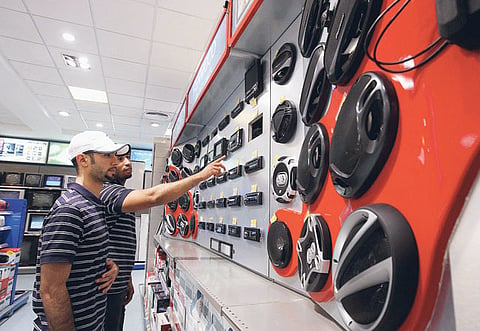Abu Dhabi set to top GCC markets
High growth economy expected to power proliferation of malls and hypermarkets

Abu Dhabi: Abu Dhabi's retail business growth will likely outperform all other markets in the Gulf Cooperation Council (GCC) in the years ahead as its rapid economic growth and high disposable income fuel consumer spending.
Abu Dhabi is home to some of the world's richest. The emirate's economy grew at a staggering 30 per cent in 2008, its gross domestic product (GDP) reaching Dh520 billion on the back of record oil prices.
Though global oil prices fell last year from their lifetime highs in 2008 due to the world economic slowdown, Abu Dhabi's economy remained relatively insulated and investments in long-term infrastructure projects meant the growth momentum continued, albeit at a slower pace.
According to reports, four new malls in Abu Dhabi are set to open within months and the retail space in Abu Dhabi is expected to increase to 1.2 million square metres from 700,000.
Fuelling the retail boom is the relatively high margin in business, which could range anywhere from 60 per cent to 70 per cent in restaurants to as high as 60 per cent in fashion accessories.
For food items, household articles and consumer durables, the margins are smaller, but their high sales volumes more than make up for the lower margins.
In gold jewellery, the world's most sought-after in precious metals, the margin ranges from 3 per cent to 10 per cent, but high sales volume drives the profitability of retail outlets.
Essential items
"There are higher growth prospects in retail. There are lifestyle products where the margins are higher and essential items such as groceries where there's a lower margin. As the city grows in terms of population, it has a huge potential for the hypermarket segment," said an Emke Group spokesman. The group runs a chain of hypermarkets nationwide.
Gold jeweller Tushar Patni said the retail gold sales rose more than 25 per cent year on year in Abu Dhabi last year.
"When the sales are good, profits are good. We have a making charge for every jewellery item we sell. Besides, we levy making charges on the gold bars that people buy from us. That's where our margins are," he said.
Some expatriates complain that the prices of goods and services in Abu Dhabi are too high compared to their native countries.
However, Mohammad Amerah, an Abu Dhabi-based economist, reminds them that this is a free market economy.
"As long as there's demand and people to buy, the retailers will continue to charge the price they want," he said.
Several glitzy malls and hypermarkets dot Abu Dhabi's landscape and there's room to accommodate many more. The reason for it isn't hard to see. The emirate is striving to become an international tourism leader for high net worth individuals from all corners of the globe, which, it's widely expected, would take its retail business to yet another level.
The Abu Dhabi Tourism Authority (ADTA) has a five-year strategic plan under which it hopes to attract 2.7 million hotel guests a year by 2012. Abu Dhabi International Airport's duty free sales grew almost 12.7 per cent last year, crossing Dh500 million ($136 million) for the first time.
"Positive passenger increase and quality of our retail offering — perfumes, cosmetics, confectionary and liquor — was the reason for the increase in sales. The two are intrinsically linked," said Dan Cappell, general manager of Abu Dhabi Duty Free.
The emirate's international airline Etihad Airways is aiming to fly 25 million passengers a year by 2020 and expand its network to up to 100 business and leisure destinations. New museums — Guggenheim and Louvre - are set to open soon and the Formula One race track which opened late last year are expected to woo deep-pocketed travellers in droves to Abu Dhabi and the UAE in the times to come.
Currently, shoppers' insatiable appetite for global brands ranging from food to fashion is met by Abu Dhabi Mall, Marina Mall, Al Raha Mall, Al Wahda Mall and Al Khalidiya mall. These malls feature high-end shops that sell everything from branded jewellery to Rolex watches and Armani clothing to Louis Vuitton accessories.
Two Carrefour outlets and a string of Abu Dhabi Cooperatives, Lulu and Emirates General Markets also vie for consumers' attention. Their round-the-year discounts on a variety of products attract customers.
However, Spinneys chief executive Johannes Holtzhausen strikes a note of caution.
"There's not a single retailer that I have spoken to in the last 12 months who says his margins have not come under pressure. Margins have come under pressure due to the increase in competition and deflation," said Holtzhausen.



